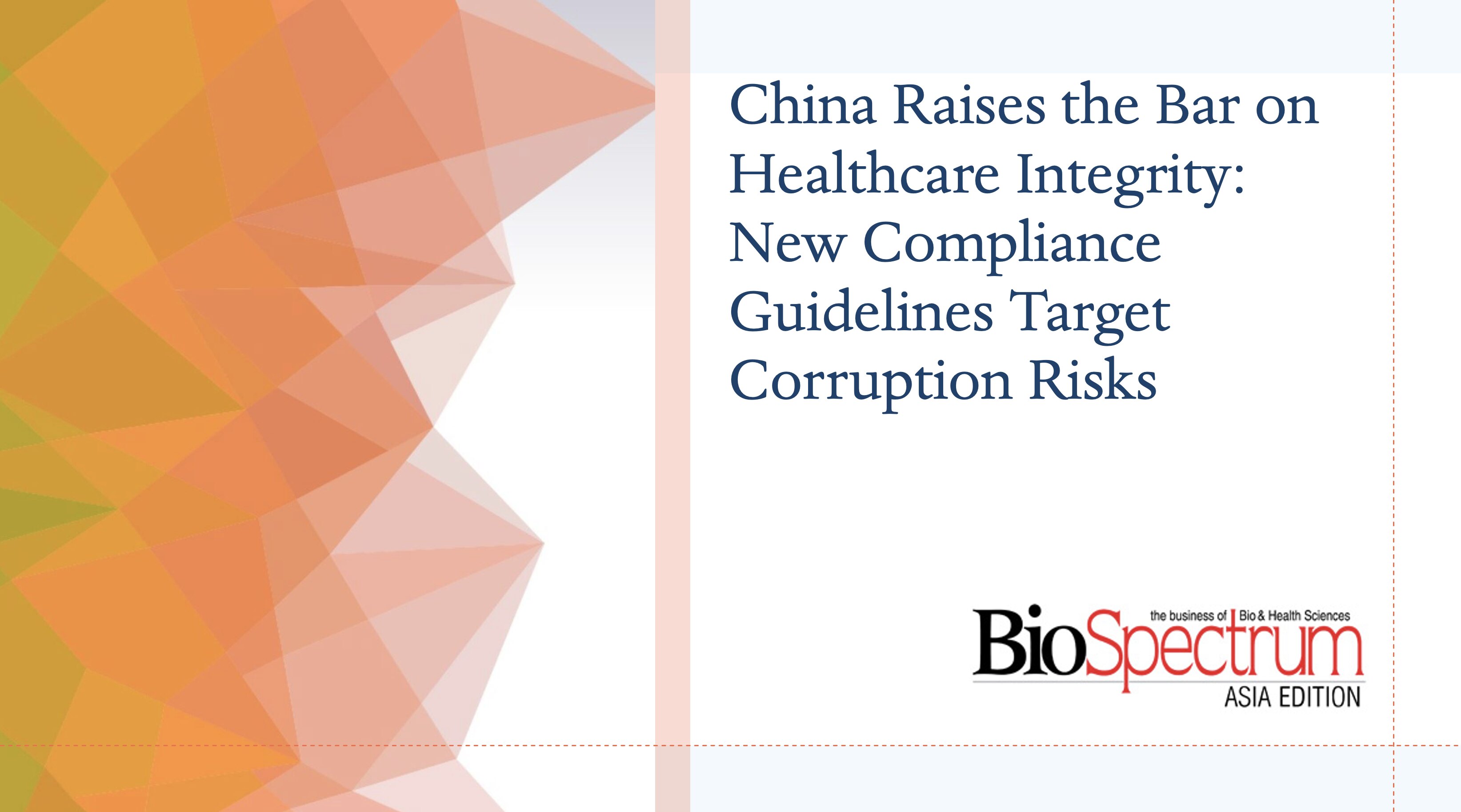China's State Administration for Market Regulation (SAMR) recently unveiled the Compliance Guidelines for Pharmaceutical Corporations on Prevention of Commercial Bribery, a landmark step in the nation’s ongoing anti-corruption campaign in the healthcare sector. These guidelines, effective from January 14, 2025, aim to provide pharmaceutical and medical device companies with a structured approach to mitigate and manage corruption risks in one of China’s most scrutinized industries. As the healthcare sector continues to grow and innovate, the emphasis on compliance underscores China’s commitment to ethical business practices and sustainable industry growth.
Addressing Corruption Risks in Key Areas
The guidelines provide a detailed roadmap for pharmaceutical and medical device companies to identify and manage corruption risks in nine high-risk areas. Each of these areas reflects long-standing vulnerabilities where unethical practices could flourish if not adequately addressed:
-
Interactions with Healthcare Professionals (HCPs):
Pharmaceutical companies often engage with HCPs for marketing, consultations, or educational initiatives. The guidelines stress the need for transparent interactions, including a clear delineation between professional collaboration and unethical inducement. This includes regulating how companies visit, educate, or involve HCPs in product discussions. -
Hospitality:
Offering gifts, meals, or entertainment to HCPs has traditionally been a grey area. The guidelines strictly prohibit any form of hospitality that could be construed as an attempt to influence medical decisions, ensuring companies maintain integrity in building professional relationships. -
Consulting Services Involving HCPs:
Consulting arrangements with HCPs must be backed by legitimate business needs, clear contracts, and fair market value compensation. This includes services like advisory boards, speaker engagements, or clinical input, all of which should be transparently documented. -
Outsourced Activities:
Third-party vendors, particularly those involved in sales and marketing, pose significant compliance risks. Companies are required to conduct due diligence on their partners and ensure that outsourced activities align with anti-corruption standards. -
Rebates:
While rebate programs are a common commercial practice, they must be implemented with clear policies and safeguards to prevent misuse as a means of illicit payments or kickbacks. -
Donations and Sponsorships:
Contributions to healthcare institutions or sponsorships for medical conferences must be detached from promotional agendas. The guidelines emphasize that such activities should not serve as incentives for prescribing specific drugs or medical devices. -
Provision of Free Medical Equipment:
Donations of medical equipment should be justified by healthcare needs and not serve as covert mechanisms for influencing procurement decisions or prescribing patterns. -
Clinical Trials and Research:
Research sponsorship, including clinical trials, must uphold scientific integrity. Financial arrangements must be free of conflicts of interest and align with ethical standards for medical research. -
Retail Sales:
Sales strategies, especially in retail pharmacy settings, should adhere to high ethical standards. Practices such as offering kickbacks or other improper incentives are explicitly prohibited.
Elevating Compliance Programs
The SAMR guidelines place primary responsibility for managing corruption risks on corporations. Companies are expected to establish robust compliance programs that can:
- Detect corruption risks early.
- Mitigate risks through tailored policies and practices.
- Respond effectively to identified risks.
The guidelines call for aligning these compliance programs with international best practices, potentially narrowing the gap between multinational corporations (MNCs) and domestic companies in terms of compliance infrastructure. This move also addresses concerns about the perceived lack of enforcement in domestic organizations, raising the bar for ethical operations across the board.
A Shifting Regulatory Landscape
The Compliance Guidelines arrive amidst broader reforms in China’s anti-corruption framework. On December 25, 2024, the National People’s Congress published draft revisions to the Anti-Unfair Competition Law. These revisions propose:
- Penalizing not only bribe givers but also bribe recipients.
- Increasing maximum fines on corporations found guilty of commercial bribery.
- Introducing new penalties targeting individuals such as legal representatives, board members, and other key personnel responsible for corporate bribery.
These changes reflect a clear message from Chinese authorities: compliance failures will no longer be tolerated, and accountability will extend beyond corporate entities to individual executives.
Implications for Multinational Corporations (MNCs)
MNCs operating in China should view these developments as part of a broader tightening of the regulatory environment. These guidelines, combined with the revised Anti-Unfair Competition Law, signal that the government is committed to leveling the playing field for all participants in the healthcare market. For MNCs, this means:
- Ensuring their global compliance frameworks are tailored to meet China’s specific requirements.
- Strengthening oversight mechanisms, especially in high-risk areas like third-party management and HCP interactions.
- Preparing for increased scrutiny and potential enforcement actions, as regulators ramp up efforts to identify and penalize unethical practices.
A Call to Action for Domestic Companies
For domestic pharmaceutical companies, the guidelines represent an opportunity to close the compliance gap with their multinational counterparts. By embracing these standards, domestic players can enhance their credibility, attract global partnerships, and compete more effectively in an increasingly regulated market.
The Road Ahead
As regulatory scrutiny intensifies, companies must adopt a proactive approach to compliance. Key steps include:
- Conducting regular risk assessments to identify vulnerabilities in business operations.
- Providing ongoing compliance training to employees at all levels.
- Leveraging technology, such as compliance monitoring software, to ensure real-time tracking and enforcement of ethical practices.
Moreover, companies should stay attuned to future regulatory developments and actively engage with industry stakeholders to shape compliance best practices.
The Compliance Guidelines for Pharmaceutical Corporations on Prevention of Commercial Bribery mark a pivotal moment in China’s anti-corruption journey. By addressing critical risk areas and emphasizing the importance of robust compliance programs, the guidelines aim to build a more transparent and ethical healthcare industry. Pharmaceutical and medical device companies—both domestic and multinational—must embrace these changes to thrive in an increasingly regulated environment.
China’s healthcare sector is undergoing transformative growth, and with it comes the responsibility to operate with integrity. As the landscape evolves in 2025 and beyond, companies that prioritize compliance will not only mitigate risks but also build long-term trust and resilience in a competitive global market.
Source : https://www.samr.gov.cn/zw/zfxxgk/fdzdgknr/jjjzs/art/2025/art_0cee28b1eba84820addc024b351b7bac.html













